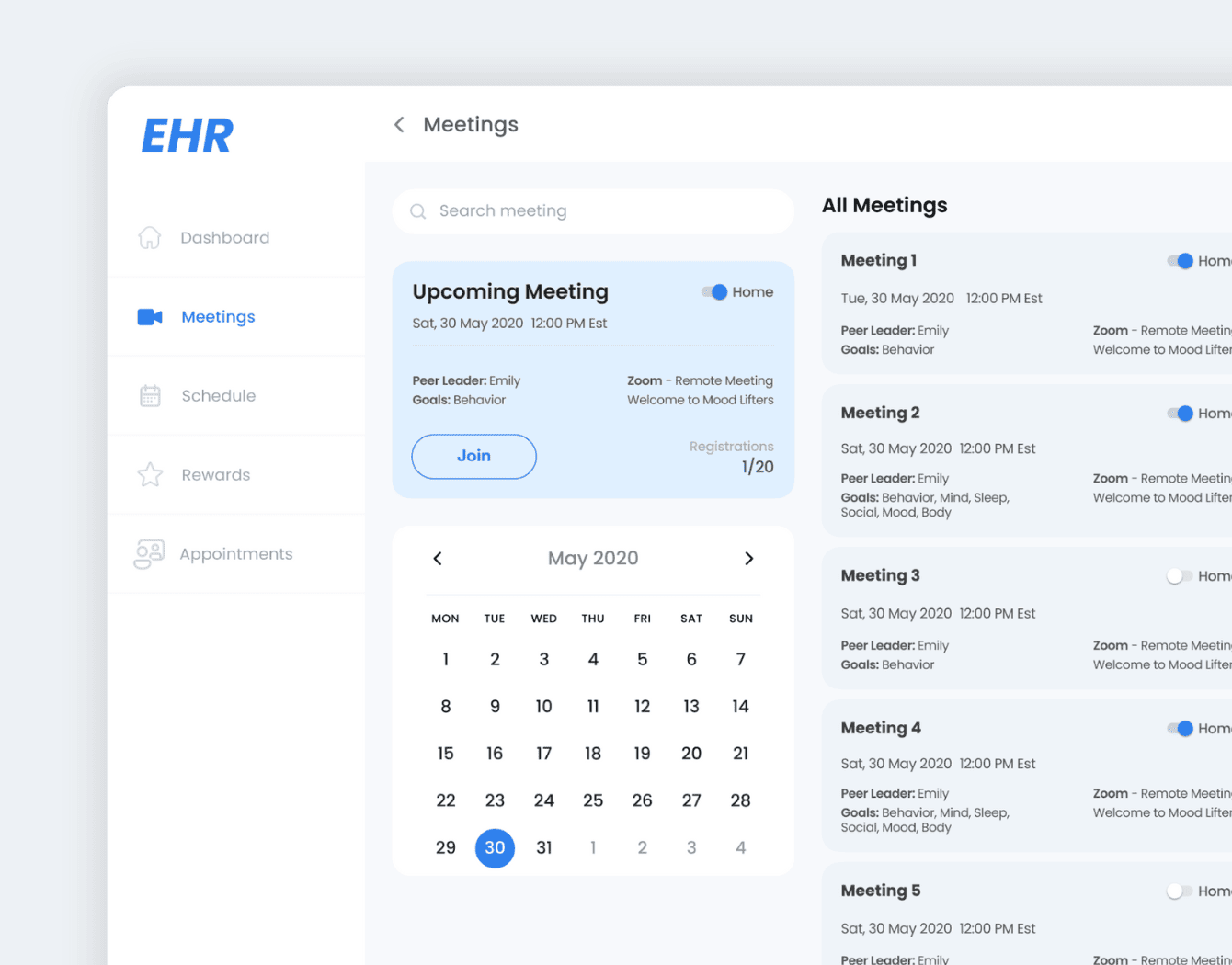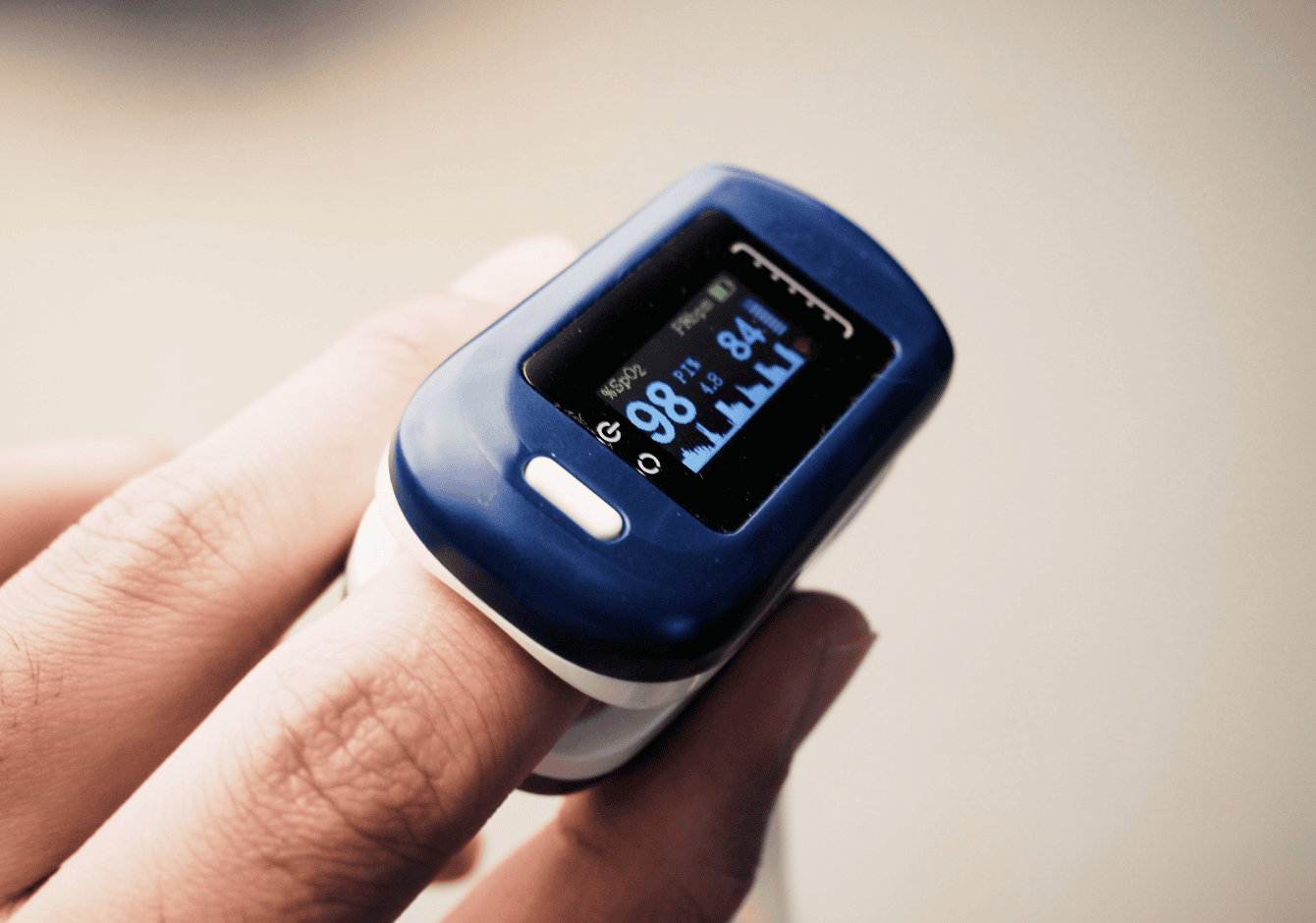The number of healthcare apps is steadily increasing and has already exceeded 350,000 healthcare applications globally. For providers looking to stay competitive and meet the ever-growing expectations of patients, embracing telehealth is crucial.
If you need guidance on what telehealth app to adopt in your organization, find the top solutions below. Discover their pros and cons and when it’s more efficient to build a custom telehealth app for tailored features and greater flexibility.
Must-Have Features of a Telemed Application
To stay competitive and provide quality care, telemedicine apps must incorporate key features that ensure a secure and user-friendly experience for patients and providers. Let’s explore the essential healthcare software features a telemedicine application must include.
Secure Sign-in and Authentication
To protect health data, prefer apps with a range of authentication measures. These include Single Sign-On (SSO) for streamlined access, Two-Factor or Multi-Factor Authentication (2FA/MFA) for added security layers, and biometric authentication for reliable identity verification. Additionally, employing security keys and regular password updates boots protection against breaches.
Appointment Scheduling
Integration with calendars and reminder notifications helps patients conveniently receive alerts for upcoming medical appointments directly on their phones. A telemedicine app for doctors with this functionality keeps physicians informed about their appointment statuses in real-time. Doctors can access appointment requests and patient profiles through the telemedicine app. The integration displays patient queues and allows for filtering based on patient profiles.
Video Conferencing
Quality video streaming is fundamental for virtually every telemedicine platform. Telemedicine mobile apps and software that lack video conferencing features risk undermining the patient experience and potentially disrupting the diagnostic process. Video quality should remain consistently high across different devices to make healthcare services available to all users.
Secure Messaging and File Sharing
Secure communication in telemedicine applications is vital for exchanging information between users and providers. This feature should support encrypted messaging and file sharing to ensure the confidentiality and integrity of patient-provider communications.
Electronic Prescriptions
The e-prescription feature significantly benefits pharmacies, patients, and prescribing doctors, facilitating faster healthcare service delivery. Doctors can generate prescriptions with automation to minimize errors and instantly transmit them to a pharmacy online. This saves time and enhances patient satisfaction.
Integration with Remote Monitoring Platforms and Devices
The RPM module and integration with IoMT devices are crucial for apps that provide continuous health monitoring. Chronic conditions like diabetes or high cholesterol, as well as serious diseases such as cancer or blood infections, require constant doctor-patient communication and health tracking.
Payment Processing
The integration of secure payment processing allows patients to pay for consultations or services directly through an app, simplifying billing and administrative tasks. The app should enable patients to make payments easily and conveniently, accepting various methods such as credit cards and online payment services. A secure payment system also helps build trust between patients and healthcare providers, which is crucial in telemedicine. Patients will feel more confident using your app if they know their payments are secure and that healthcare professionals get fair compensation.
Doctors Catalog
It serves as a repository for information on healthcare professionals available for telehealth consulting. In addition to basic details like profile photo, name, educational qualifications, and medical specialty, the doctor’s profile may include medical license details, years of experience, and a list of current and past clinics where the physician practices.
Integration with EHR Systems
EMR functions as a healthcare-oriented CRM system that consolidates patient visit details, diagnoses, and medical records into a unified platform. It streamlines healthcare services by reducing the burden of daily paperwork. EHR integration with telehealth apps further enhances EHR efficiency by keeping patient records in one accessible location, which prevents data duplication during virtual visits.
Telemedicine Analytics
Analytics and reporting are vital for healthcare providers. They offer valuable insights into patient behavior, app usage patterns, and satisfaction, which help improve the app and enhance patient care quality. These analytics enable providers to identify trends, predict users’ needs, and customize services to meet specific requirements.
10 Best Telehealth Apps That Are The Most Popular In the Market
Nearly 40% of adults reported using telemedicine services annually, meaning apps are in high demand today. Below, we have gathered the best telehealth apps and reviewed their features, pros, and cons to provide a concise overview of the market offer.
1. Doctor On Demand – Best Telehealth App for 24/7 Visits
Doctor On Demand is considered the best telehealth app since it offers many services, including urgent care, mental health, preventive health, and chronic care management. The app supports video conferencing, e-prescriptions, and access to medical history, making it a versatile choice for health needs.

Core features:
- Video conferencing.
- E-prescriptions functionality that allows doctors to prescribe medications during virtual visits.
- Provides access to medical history with patients’ medical records.
- Preventive health support that includes lifestyle counseling, lab work, smoking cessation assistance, and more
Pros of Doctor On Demand telehealth app:
- Covers wide range of services like urgent care, mental health, chronic care, and preventive health.
- Offers 24/7 access to healthcare professionals that reduces the need for physical visits.
- Enable integration with health tools, including Apple’s HealthKit.
- Thanks to high coverage, the app is available to over 98 million people and has facilitated over 3 million telehealth visits
Cons of Doctor On Demand telehealth app:
- May not be helpful for emergencies or urgent medical conditions requiring immediate attention, as it may fail to provide timely access to emergency care or interventions.
- May not always be covered by insurance, leading to out-of-pocket expenses for patients. The cost of virtual visits varies depending on the individual’s insurance plan or payment model.
Best for:
- Patients seeking a one-stop solution for various health services, including urgent, chronic, and preventive care.
- Individuals looking for accessible and flexible healthcare options online.
2. Amwell – Best Telehealth App for Comprehensive Services
Amwell provides urgent care, therapy, psychiatry, nutrition, and other telemedicine services. It features video conferencing, scheduling, e-prescriptions, and integration with Apple’s HealthKit. It is notable for being one of the first teladoc apps to receive accreditation from the American Telemedicine Association.

Core features:
- Video conferencing;
- Appointment scheduling;
- E-prescriptions;
- Integration with HealthKitt;
- Includes a feature to search for specialists with detailed profiles and ratings.
Pros of Amwell telehealth app:
- Offers a wide range of healthcare services, from urgent care to specialized therapy and nutrition advice.
- The first telehealth service accredited by the American Telemedicine Association, ensuring high standards of care.
- Has an Intuitive interface and easy-to-navigate app features.
- Provides around-the-clock access to healthcare professionals, enhancing convenience for users.
Cons of Amwell telehealth app:
- It is more expensive than other telehealth options, particularly without insurance coverage.
- Although it offers 24/7 access, there can still be wait times during peak hours.
Best for:
- Immediate medical attention or specialized care in areas like therapy and nutrition.
- Individuals looking to integrate their health data seamlessly with Apple’s HealthKit.
- Those who prioritize accredited and high-standard telehealth services.
3. MDLIVE – Top-Notch Privacy and Security
MDLIVE has been a significant healthcare player for years, offering access to board-certified physicians in primary care, behavioral health, and dermatology.

Core features:
- Appointment scheduling.
- Video conferencing.
- Depending on the insurance, copays for participating plans may be as low as $0. Pricing is always shown upfront with coverage and copay details, so there are no surprise costs.
- Connects users with board-certified physicians in various specialties, including primary care, behavioral health, and dermatology.
Pros of MDLIVE telehealth app:
- Covers primary care, mental health, and dermatology.
- Ensures high-quality care by connecting users with board-certified healthcare professionals.
- Provides 24/7 access to healthcare services, making it easier for users to get care when needed.
- User-friendly interface.
Cons of MDLIVE telehealth app:
- Not all insurance plans cover all MDLIVE services.
Best for:
- Immediate access to healthcare services for non-emergency conditions.
- Behavioral health support with access to licensed therapists and psychiatrists.
- Specialized care for skin conditions without the need for in-person visits.
4. Talkspace – Best Telehealth App for Online and Mobile Therapy
Talkspace specializes in mental healthcare, providing therapy through chat, video, and voice calls. It offers AI-based assessments and e-prescriptions. It is one of the most popular teletherapy apps for mental health issues like depression, anxiety, and trauma.

Core features:
- Provides multiple communication options for therapy sessions like therapy via chat, video, and voice calls.
- Uses AI to help assess users’ mental health needs and match them with appropriate therapists.
- Enables licensed psychiatrists to prescribe medications if needed.
- Includes individual therapy, couples therapy, and teen therapy.
- Connects users with licensed mental health professionals.
Pros of Talkspace telehealth app:
- Offers various ways to communicate with therapists, catering to user preferences and needs.
- Provides targeted support for a wide range of mental health issues, from anxiety and depression to trauma and substance abuse.
- Allows users to access therapy from anywhere, anytime.
- Offers different subscription plans to suit various needs and budgets.
Cons of Talkspace telehealth app:
- Monthly subscription fees can be high, especially without insurance coverage.
- There might be delays in responses depending on the communication method.
Best for:
- Professional help for mental health issues such as depression, anxiety, and trauma.
- Individuals with busy schedules who need flexible therapy options.
- Users who prefer or require remote access to mental health services due to location, mobility issues, or personal preference.
5. LiveHealth Online – Telehealth App With Board-Certified Doctors
LiveHealth Online allows users to choose their doctors based on profiles and ratings. It offers medical care, allergy, psychology, and psychiatry services, with secured video calls and e-prescriptions.

Core features:
- Users can choose their doctors based on detailed profiles and ratings.
- Secure, HIPAA-compliant video consultations with healthcare providers.
- Enables doctors to prescribe medications electronically during consultations.
- Accepts many insurance plans, which can reduce the cost of visits.
Pros of LiveHealth Online telehealth app:
- Allows choosing specific doctors based on user preferences and needs.
- Provides 24/7 access to healthcare services, making it convenient for users to get care anytime.
- Offers a broad spectrum of healthcare services, ensuring comprehensive care.
- May be more affordable than traditional in-person visits, especially for users with insurance coverage.
Cons LiveHealth Online telehealth app:
- Despite 24/7 availability, users might experience wait times during peak hours.
- May be expensive for individuals without health insurance coverage.
Best for:
- Users who want to choose their healthcare providers based on detailed profiles and ratings.
- Individuals needing a wide range of services, from primary care to specialized treatments.
6. Doximity – Online Networking Telehealth App for Health Professionals
Doximity is widely used among healthcare workers thanks to professional features tailored to medical practitioners, like secure voice and video calls, customized caller ID, and in-app faxing.

Core features:
- Calls are never recorded, and all calls and messaging are encrypted.
- Allows doctors to use their office number as the caller ID when calling patients.
- Enables easy sending and receiving of faxes using the app.
- Connects doctors with other healthcare professionals, facilitating collaboration and information sharing.
- Offers continuing medical education (CME) opportunities through the app and helps doctors to meet their educational requirements.
Pros of Doximity telehealth app:
- Provides a highly secure platform for voice and video calls, ensuring patient confidentiality.
- Tailored specifically for healthcare professionals, including features like customized caller ID and in-app faxing.
- Facilitates connection with a large network of healthcare professionals, enhancing collaboration and referrals.
- Offers CME credits and educational resources within the app, supporting ongoing professional development.
Cons of Doximity telehealth app:
- Primarily focused on healthcare professionals, with fewer direct patient-facing features compared to other telehealth apps.
- Some features may require a subscription, which may be expensive for smaller practices or individual practitioners.
Best for:
- Doctors, nurses, and other healthcare providers looking for secure, professional communication tools.
- Professionals seeking to network, share information, and collaborate with peers.
- Healthcare providers who need additional communication tools like in-app faxing and customized caller ID to manage their practice efficiently.
7. 98point6 – Best Telehealth App for Async and Real-Time Telehealth
98point6 focuses on text-based primary care, providing discreet and convenient consultations via text messaging. It supports primary care and mental health with affordable and flexible scheduling.

Core features:
- Enables users to communicate with healthcare providers through secure text messaging.
- Covers a wide range of primary care needs, including diagnosis, treatment, and follow-up.
- Provides consultations for mental health issues, connecting users with licensed professionals.
- 24/7 availability.
- Uses a subscription model to keep costs predictable and affordable.
Pros of 98point6 telehealth app:
- Text-based consultations ensure confidential communication, ideal for users who prefer privacy.
- Subscription-based pricing makes healthcare more affordable compared to traditional in-person visits.
- 24/7 availability and a text-based format provide flexibility for users with busy schedules or those who need immediate care.
- Supports both primary care and mental health, and addresses a broad spectrum of healthcare needs.
Cons of 98point6 telehealth app:
- Limited functionality for complex health issues since text-based communication may not be suitable for more complex medical conditions that require physical examinations.
- While 24/7 access is available, there may be delays in response times during peak periods.
Best for:
- Users who prefer a private and discreet way to access healthcare services.
- Anytime access to primary care and mental health support.
- Individuals looking for an affordable healthcare option without compromising on quality.
8. Virtuwell – Personalized Care Telehealth App
Virtuwell offers affordable healthcare services provided by board-certified nurse practitioners. It covers a variety of health issues, including women’s health, children’s health, and chronic conditions. The app providers emphasize cost savings, with a maximum visit fee of $59.

Core features:
- Board-certified nurse practitioners.
- Covers various health issues, including women’s health, children’s health, and chronic conditions.
- Users can access services without prior appointments.
Pros of Virtuwell telehealth app:
- 24/7 availability ensures users can get healthcare whenever they need it.
- Provides targeted care for a variety of health concerns, from routine issues to chronic conditions.
Cons of Virtuwell telehealth app:
- Services may not cover all medical conditions, particularly those requiring in-person examinations or doctor interventions.
- Care is provided by nurse practitioners, which may not be suitable for all patients or conditions.
Best for:
- Affordable healthcare services.
- Managing routine health issues and chronic conditions, particularly in women’s and children’s health.
- Immediate healthcare access without the hassle of scheduling appointments.
9. HealthTap – Affordability and Convenience
HealthTap provides comprehensive healthcare services, including chronic care and mental health, with features like a doctor-trained AI symptom checker, video visits, and lab tests. It recently partnered with Samsung to expand its virtual healthcare services to smart TVs.

Core features:
- Uses AI to help users identify potential health issues based on their symptoms.
- Real-time video consultations with healthcare providers.
- Enables users to order and receive lab tests, uploading results into the app for easy access.
- Provides ongoing support for managing chronic health conditions, such as diabetes, high BP, allergies, high cholesterol, gastrointestinal disorders, arthritis.
- Provides access to mental health professionals for therapy and counseling.
- Partnership with Samsung enables users to access HealthTap services directly from their smart TVs.
Pros of HealthTap app:
- The AI symptom checker enhances self-diagnosis and helps users understand their health better.
- The integration of smart TVs enables users to access healthcare services from the comfort of their homes.
- It provides continuous support for chronic conditions, ensuring consistent management and follow-up.
Cons of HealthTap app:
- Some services, particularly video visits and lab tests, may be expensive without insurance.
- The quality and speed of service vary depending on the healthcare provider and time of access.
Best for:
- Regular monitoring and management of chronic health issues.
- Users who are comfortable using technology, including smart TVs, to access healthcare services.
- Individuals seeking a one-stop solution for a wide range of health services, from diagnosis to treatment and follow-up.
10. Walmart Health Virtual Care – Best App for Low-Cost Services
Walmart Health Virtual Care (formerly MeMD) offers a broad range of services, from mental health to urgent care and diabetes management. It includes real-time video or phone visits, e-prescriptions, and referrals for specialists.

Core features:
- Immediate access to healthcare providers through secure video or phone consultations.
- 24/7 availability.
Pros of Walmart telehealth app:
- A versatile option for many users since it offers primary care, men’s and women’s health, urgent care, and psychiatry.
- The intelligent referral system ensures users are connected with the appropriate specialists, enhancing the continuity of care.
- As part of the Walmart system, the telehealth app aims to provide cost-effective healthcare solutions.
Cons of Walmart telehealth app:
- Although aimed at affordability, some services, such as specialist referrals and certain prescriptions, might incur additional costs.
Best for:
- Users who require a wide range of services, from urgent care to chronic disease management.
- Individuals looking for affordable healthcare options integrated with a major retail provider.
Overall, ready-made healthcare software is standard and tailored to multiple uses. As a result, some features may not be relevant to your organization and use cases. It can also come with hidden costs and may not fully address your needs, so you may need to consider custom software development.
When a Custom Telemedicine App is Better Than a Ready-Made Solution For Your Organization
Every healthcare facility is unique, with its business approach and specific requirements. Custom healthcare software development is often the best choice to meet these individual needs. Such personalized healthcare products are tailored to your existing processes and facilitate the seamless launch of new digital workflows.
With custom healthcare software, you own the developed application, which allows you to add personalized features and create an interface designed for maximum ease of use. There is also no hidden functionality or costs, among other benefits.
Full Adaptation to Your Business Needs
Custom development allows you to create an app that exactly meets the needs of your medical business. This applies to both functionality and user interface design. You can consider all the nuances of your work, ensuring maximum convenience for users and doctors.
Integration with Existing Systems
One of the main advantages of custom solutions is the ability to integrate with your existing systems, such as electronic medical records, patient management systems, and accounting software. This ensures the continuity of workflows across different platforms and helps prevent compatibility issues that often arise when using off-the-shelf software. Custom solutions are tailored to work harmoniously with your organization’s existing tools and processes, enhancing efficiency and effectiveness.
Enhanced Data Security
Medical data security is essential for staying regulatory compliant and getting more control over data processing. A custom app allows you to implement all necessary measures to ensure high information protection, including data encryption, access control, and compliance with security standards and regulations.
Flexibility and Scalability
With a custom app, you can make changes and add new features as your organization grows and evolves. This keeps the app relevant and ensures it meets the new requirements of users and industry standards.
Long-Term Cost-Effectiveness
While the initial investment for developing a custom healthcare solution ranges from $50,000 to $200,000 depending on complexity and functionality, compared to off-the-shelf solutions that typically cost $10,000 to $50,000 annually, the long-term benefits outweigh the upfront expenses. Investment in custom software development will pay off in several years due to no licensing fees, customization charges, and other hidden costs.
Increased Competitiveness
A custom app can become your competitive advantage, as it allows you to offer patients unique services and conveniences that your competitors do not have. This helps attract new clients and increase the loyalty of existing ones.
Empeek for Telehealth App Development
With about 10 years of experience, Empeek offers telehealth app development services tailored to meet the unique needs of healthcare providers. Our team specializes in creating custom telehealth applications that enhance patient engagement, streamline operations, and improve the quality of care. We ensure that custom apps we develop will integrate with your existing systems and workflows to provide a user-friendly experience for doctors and patients.
AI-powered Heart Monitoring: A Case Study in Improved Efficiency & Accuracy
Empeek developed an innovative AI system to improve real-time heart monitoring solutions. The traditional approach was slow, prone to errors, and difficult to scale due to high reliance on human resources.
Empeek’s Solution:
- A neural network model trained on cardiologists’ expertise and a vast database of heart rate data.
- Automated event review and denial for low-risk cases (below 50% threshold).
- AI-powered classification and recognition of different heart events.
- Common events (e.g., VEB, PVCs)
- Escalated events (e.g., Afib, Tachycardia)
Mental Health EMR/EHR Software Development

Empeek partnered with Northern Michigan CHIR to develop Moodlifters, a mobile app with a web counterpart for healthcare providers. This program tackles the growing need for mental health support by offering a user-friendly platform. Patients can track their well-being through surveys and goal setting, while doctors gain a streamlined system for managing patients and analyzing data. Moodlifters utilizes automation to improve efficiency and features a secure platform that prioritizes patient privacy.
Conslusion
The telehealth industry has seen tremendous growth, with numerous apps available to meet the increasing demand for virtual healthcare services. In this article we discussed the top 10 telehealth apps, highlighted their core features, pros, cons, and ideal use cases.
While ready-made telehealth solutions offer convenience and a range of capabilities, organizations often require custom telehealth app development to address their unique needs, existing systems, and specific workflows. Custom apps offer several advantages, like full adaptation to business requirements, integration with existing systems, enhanced data security, flexibility and scalability, long-term cost-effectiveness, and increased competitiveness.
The decision to choose a ready-made telehealth app or invest in custom development depends on factors such as the organization’s size, specific requirements, and future growth plans. For organizations that seeks a tailored and future-proof telehealth solution, custom app development is often the better choice, despite the higher initial investment.
Ultimately, whether using ready-made or custom telehealth apps, the goal is to provide patients with convenient, secure, and high-quality virtual healthcare services that improve access to care and improve overall patient experiences.
Have a telehealth app idea or challenge? Contact us to get consulting and a project estimate.








